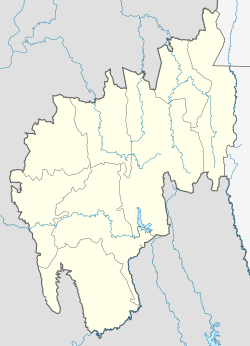Rasu Kami
It is proposed that this article be deleted because of the following concern:
If you can address this concern by improving, copyediting, sourcing, renaming, or merging the page, please edit this page and do so. You may remove this message if you improve the article or otherwise object to deletion for any reason. Although not required, you are encouraged to explain why you object to the deletion, either in your edit summary or on the talk page. If this template is removed, do not replace it. The article may be deleted if this message remains in place for seven days, i.e., after 14:56, 4 June 2025 (UTC). Find sources: "Rasu Kami" – news · newspapers · books · scholar · JSTOR |
Another editor has reviewed this page's proposed deletion, endorses the proposal to delete, and adds:
If you remove the {{proposed deletion/dated}} tag above, please also remove this {{Proposed deletion endorsed}} tag. |
Rasu Kami | |
|---|---|
village | |
| Coordinates: 23°49′05″N 91°28′34″E / 23.818°N 91.476°E | |
| Country | |
| State | Tripura |
| Languages | |
| • Official | Bengali, Kokborok, English |
| Time zone | UTC+5:30 (IST) |
| Vehicle registration | TR |
| Website | tripura |
Rasu Kami is a small Tripuri village situated on the foot-hills of Boromura hill range in Sadar sub-division of West Tripura, India.[citation needed] It lies 3 km west of Champaknagar from the Assam-Agartala highway and 4 km north of Jirania. The people speak a local language of Kokborok. The population of the village is 60 persons.[citation needed]
Origin of the name
[edit]The name Rasu Kami or Rasu Para as it is known, has a history from before the independence of India. The villages of Tripura had a tradition of naming their villages after the village head or the most powerful and influential person of the village.
A tribal person from the Tripuri community, Horijoy Debbarma had three sons and a daughter. Amongst them, the second son, Samprai Debbarma with his wife Sandhya Mali Debbarma, settled on the present day Rasu Kami. They had four sons: Rajkumar Debbarma, Sikirai Debbarma, Khilingrai Debbarma, and Sukuram Debbarma. The village where Samprai Debbarma settled was previously known as Horijoy Kami named after his father Horijoy Debbarma. It was here in this village where Rajkumar was born. Later on when Rajkumar grew up and became a very well known and influential person, the village name was changed to Rasu Kami following the tradition.
The economy
[edit]The people here are involved mainly in farming, driving, business and education. Farming is mainly of paddy. But plantations of bamboo, pineapple, banana, and mango is also done. Fish rearing is also done by few families in their ponds. There is a state-owned sericulture farm nearby. Many brick industries surrounds this village which are the main source of the pollution in this village. Of course they can be termed as one of the source of income too.
The Ring Kua
[edit]There is a ring-well in the heart of the village which has never dried since it was dug and prepared. Even if wells and ponds of nearby villages dry up still it doesn't dry. It has been the source of water for this village as well as the nearby surrounding villages. It has been quenching the thirst of all people and animals dwelling in and around Rasu Kami.
Neighbouring villages
[edit]Nearby villages are Basiram Kwpra, Mangal Sardar, Purna Thakur, Kumar Sadhu, Sarath Chowdhury, Khamarbari, Kolabagan, Kulang Thakur and Joynagar.

